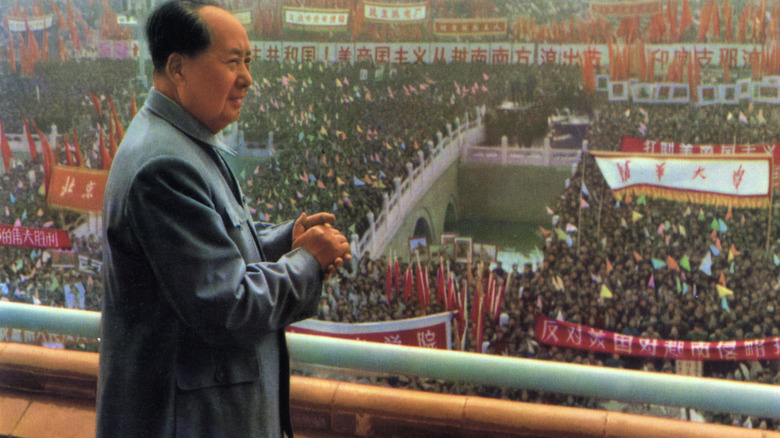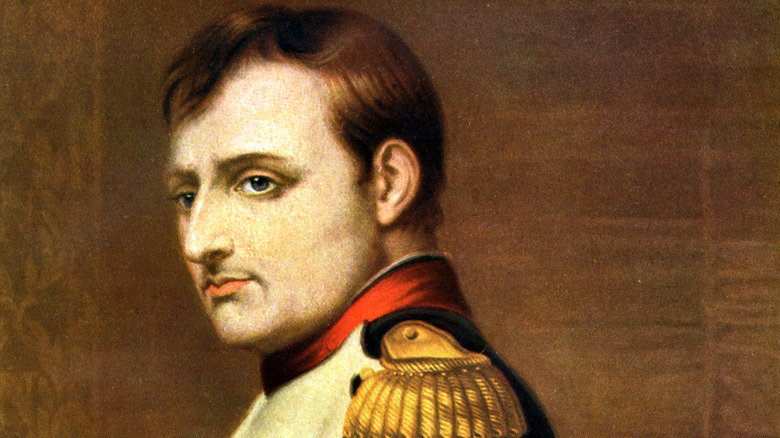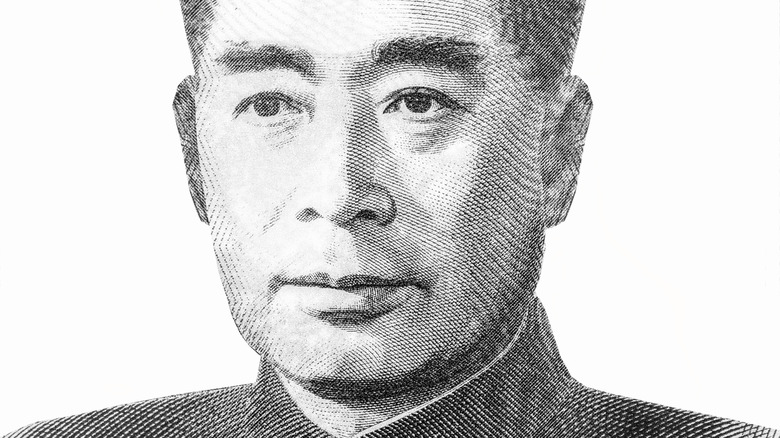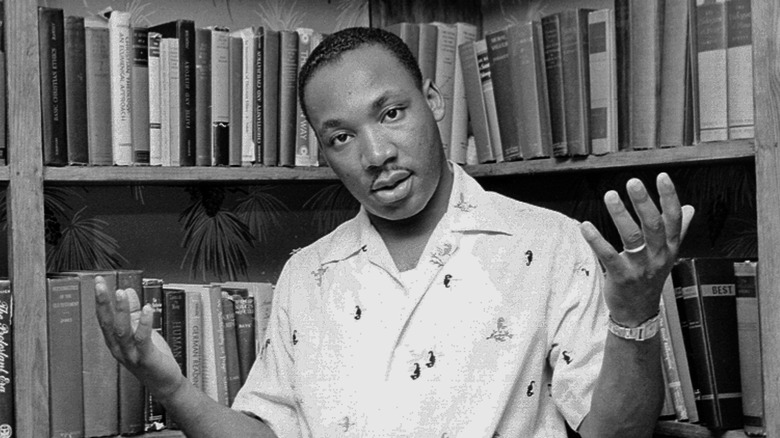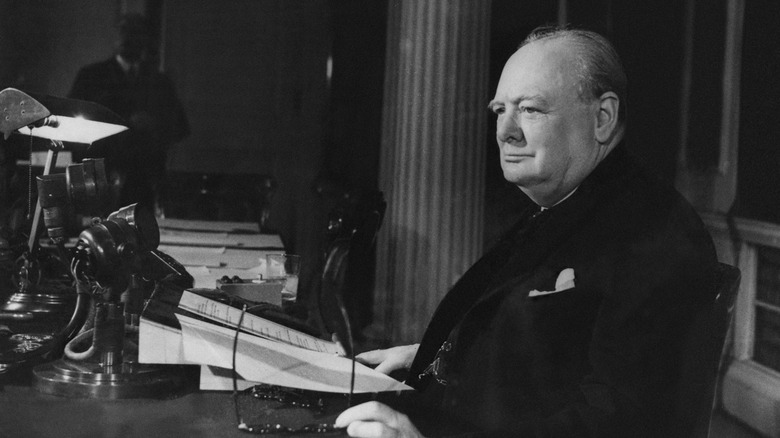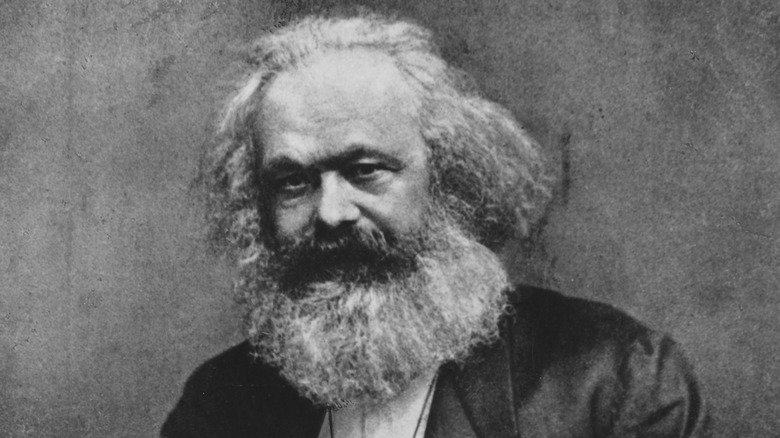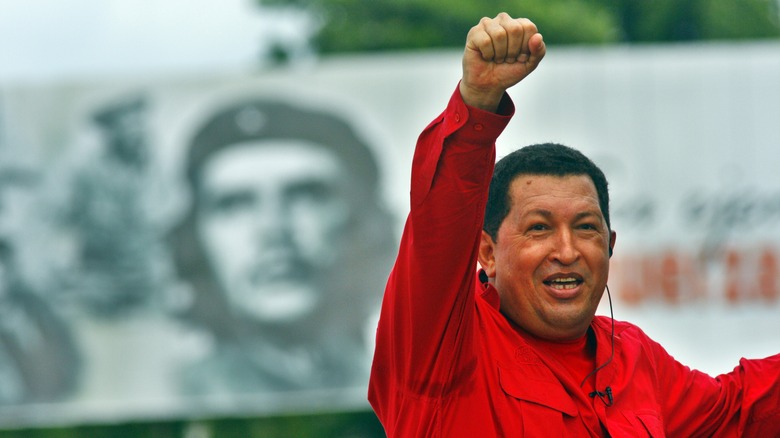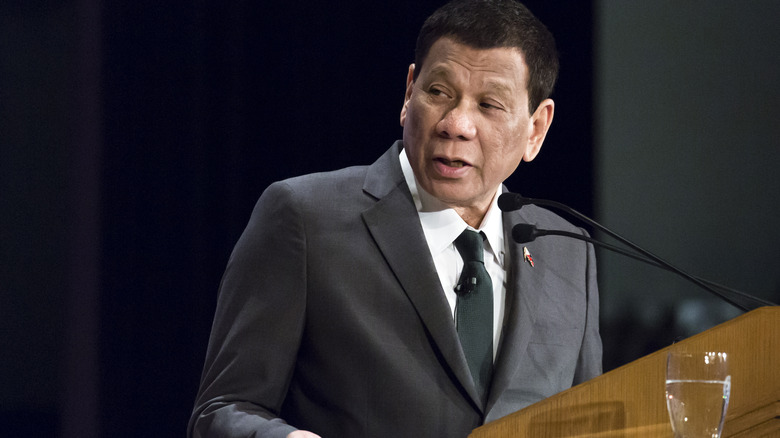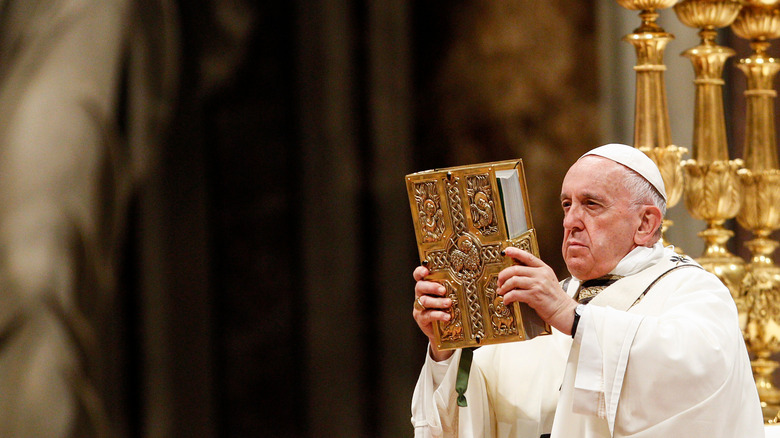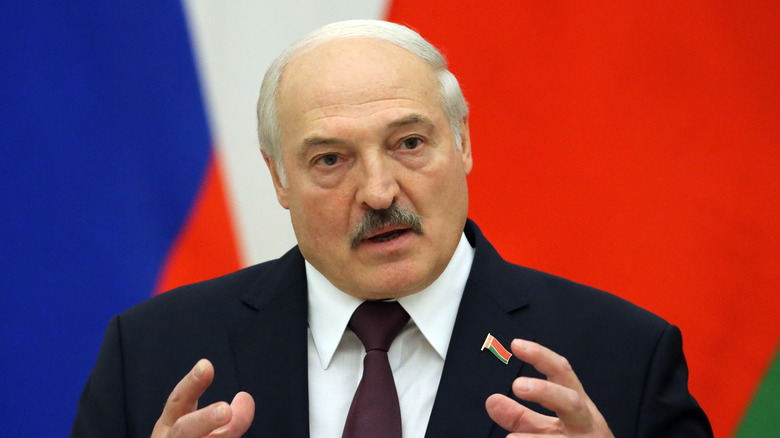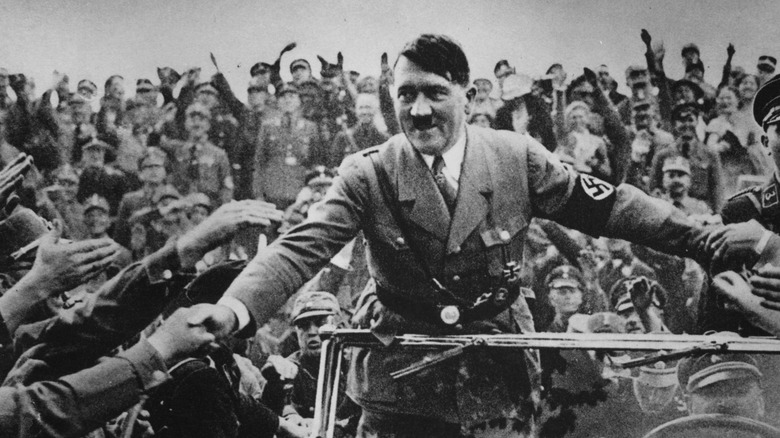Advice We Learned From World Leaders That You Should Totally Avoid
In a perfect world, only the best and brightest among us would rise to top positions of power, to the role of president, prime minister, queen, chief, or whatever the given title may be to the leadership role of a given nation or cultural group. Often, it is those of strongest virtue and keenest intellect who rise to those roles. But for every Abraham Lincoln extolling his countrymen to move on after the American Civil War "with malice toward none; with charity for all" or Mahatma Gandhi's advising that "if we could change ourselves, the tendencies in the world would also change," a lot of world leaders have given some abjectly terrible advice over the years.
Some of the worst advice ever shared by world leaders came from world leaders who were, for lack of a better term, inept. In other cases, the poor advice came from people who may not have been objectively foolish or inept, but were not equipped for the role they landed, thus finding themselves on too large and grand a stage for their utterances. And in a few cases, we have examples of perfectly terrible advice coming from world leaders who were, for almost all intents and purposes, decent folk. After all, becoming a king or president or czar or whatever else hardly cures anyone of their original condition of being human.
"Impossible is a word to be found only in the dictionary of fools"
"Impossible is a word to be found only in the dictionary of fools," said French Emperor Napoleon Bonaparte (via War History Online), a man who did indeed achieve some feats in his lifetime that may have seemed nearly impossible. He also pushed his luck too far on far too many occasions, squandering the victories he had won and falling from grace, twice, to end his life in exile, in deep depression, and suffering in agony from stomach ulcers which turned cancerous to boot, according to Live Science.
Had Napoleon instead had sentiments along the lines of "Trying really hard but knowing when to stop is an approach followed by wise people," he may well have enjoyed a long, peaceful reign after the initial campaigns he led in Egypt and Italy. Indeed, following the Treaty of Amiens, signed in 1802 per History Today, the wars of the French Revolution were ended and a peace with Britain was agreed upon — that would have been a good time to take it easy. Instead, Napoleon took it to Austria, to Russia, to Iberia, to Belgium, and ultimately he was taken to the rather dismal island of St. Helena, where he would live out the last six years of his life (via History).
"The government needs criticism from its people"
Objectively speaking, the idea that "the government needs criticism from its people," put forth by Chinese Premier Zhou Enlai in the late 1950s, is one to live by. In fact, the rest of the quote goes: "Without this criticism the government will not be able to function as the People's Democratic Dictatorship. Thus the basis of a healthy government lost ... We must learn from old mistakes, take all forms of healthy criticism, and do what we can to answer these criticisms," according to Smithsonian Magazine.
The problem with Zhou's exhortation was that he was making it at a time and in a place where criticizing the government could and did get people arrested, imprisoned, tortured, and often killed. In fact, nearly three quarters of a million perceived dissidents had been killed in the early years of the 1950s, and many who did have the audacity to speak out against the government following Zhou's words ended up in labor camps or in graves.
"Are you careful with your grooming? Do you nag? Do you make him feel important?"
These questions, "Are you careful with your grooming? Do you nag? Do you make him feel important?" and others like them, were asked of women who wrote into an advice column complaining that their husbands were being unfaithful. The man who, essentially, told the wives of these faithless men to be better wives was, unfortunately, Martin Luther King, Jr. According to the WNYC Studios program On the Media, before King was a towering pillar of the Civil Rights Movement, a role for which he is rightly revered, he was an advice columnist with "Ebony," and often his advice was pretty bad.
King was still a young man at the time of this misguided advice, the like of which he provided multiple times to women with similar issues with their husbands, and one can assume he would become more nuanced and less sexist as he grew up some, especially given his profound life experiences. But taken on its own, this is advice best rejected flatly.
"If you turn into a crocodile, it's your problem"
The COVID-19 pandemic has revealed dangerous levels of misinformation and mismanagement at some of the highest levels of government, according to U.S. News. This isn't a problem relegated to a single country, but Brazilian president Jair Bolsonaro has made a statement that probably shouldn't be taken to heart. The quote — "If you turn into a crocodile, it's your problem" — was in regard to side effects of COVID-19 vaccinations. Never mind that no serious side effects to the vaccines have been reported on any large scale (via CDC), while death of the unvaccinated has been on a scale that's hard to fathom.
Not only has Bolsonaro been outspoken against safety measures that can (and could have) saved lives, he has even used the powers of his office to proactively interfere in matters of public health, such as striking down mask mandates and obstructing regional governments from implementing social distancing rules. His advice to not get vaccinated is very bad advice, and at a time when the world needs the best leadership to be had.
"Gandhi should not be released on the account of a mere threat of fasting"
Winston Churchill was generally a great man, and surely a great wartime leader. He believed in democracy and hated totalitarianism. He wrote with wit and eloquence and led with a steady hand (via Britannica). But on one issue, he was stuck in the past, and that issue was India, according to BBC News. Like far too many Englishmen of his day, Churchill just could not stomach the thought of Great Britain losing the so-called "jewel" that was India, a land it had forcibly occupied for generations. Thus it was that Churchill came to loathe a man now seen as one of the greatest, most impressive figures of the 20th century: Mahatma Gandhi.
Churchill was cold when he said: "Gandhi should not be released on the account of a mere threat of fasting." He was flippant for describing Gandhi's agonizing hunger strikes as mere fasting; he denigrated an impressive show of nonviolent protest. And he was wrong because what Gandhi was fighting against was the real issue — namely the ongoing subjugation of millions of human beings living in what would become the independent nations of India and Pakistan.
And the above quoted admonition about the Mahatma was no one-off spoke in a fit. Churchill said similar things many times, such as this vile statement he also made: "We should be rid of a bad man and an enemy of the Empire if he died."
"Democracy is a form of government that cannot long survive"
Sure, democracy took a couple thousand years off between the Macedonian suppression of Greek rule in the fourth century B.C., per PBS, and the Age of Enlightenment (via CRF), but the past few hundred years have proven that Karl Marx was wrong when he stated: "Democracy is a form of government that cannot long survive" (via "Sovereignty and Freedom Points and Authorities, Litigation Tool"). Marx and those that subscribed to his political philosophies felt certain that, eventually, communism would become the way of the world, with all societies adopting this type of arrangement as part of the natural order of progress (via The Daily World).
In fact, what's become clear since Marx's days — days which ended with his death in 1883, via Britannica, for some context — is that communism only ever "worked" when it was enforced by cruel, oppressive governments ruling in more of a totalitarian dictatorship than in a blissful land of equals. None of which is to say that any democratic government on earth today is or ever has been perfect, but as Winston Churchill quoted: "Democracy is the worst form of government except all those other forms that have been tried" (via The New York Times).
"Capitalism is the way of the devil and exploitation"
The full quote regarding Capitalism spoken by the late Venezuelan president Hugo Chavez was: "Capitalism is the way of the devil and exploitation. If you really want to look at things through the eyes of Jesus Christ — who I think was the first socialist — only socialism can really create a genuine society." Known for red shirts, lots of shouting and bombast, and terrible economic and social policies, Chavez was not as known for his thoughtful, nuanced statements. This one, according to Reuters, was made in 2006, a year Chavez fairly won re-election to office in a huge victory.
Within three years, however, a Venezuelan referendum removed presidential term limits and Chavez, now tipping toward dictatorial status, vowed to stay in power for at least another decade, via CFR. And a few years later (and after Chavez's death), this take on capitalism was proved off-base when Venezuela, supposedly a socialist nation, saw its economy take a nosedive. According to data from Statista, the slide began in 2015, with the GDP falling each year. It is now below levels seen in the 1980s.
"Just go to the gasoline station, and then have some drops, that's disinfectant"
Just to be very clear — as in crystal clear — do not use gasoline as a disinfectant. And especially not for disinfecting a face mask you will strap over your, you know, nose and mouth. But of course you probably don't need to be explicitly told not to do that. Well, not only did the president of the Philippines not tell people not to use fuel as a face mask sterilizer, he in fact did the opposite and suggested they should.
According to Gizmodo, Rodrigo Duterte actually said that Philippine citizens with dirtied COVID-19 masks should "Just go to the gasoline station, and then have some drops, that's disinfectant." And when some in his circle tried to deflect the surge of criticism Duterte got after this statement by saying he was only joking, he skipped the face-saving opportunity and doubled down, saying: "I am not joking. That is true. You think I am just kidding?"
"[Don't] obey the invisible hand of the market"
Pope Francis knows all about matters biblical, clerical, ecclesiastical, and unfortunately, legal, but he's not an expert when it comes to matters of economics. So it's really best if you ignore his economic advice, such as when in 2017 he admonished a group of global finance students not to "blindly obey the invisible hand of the market," according to the Independent Institute. The pope meant well, to be sure, feeling that a devotion to money only leads to greater gaps between the rich and the poor, which can be true when the rich are greedy and ruthless.
But the way to help lift people out of poverty is not to reject market principles that have been recognized as functional — that includes the "invisible hand of the market," a concept created in the middle of the 1700s by renowned Scottish economist Adam Smith. In fact, according to Britannica, the invisible hand refers to the uplifting and betterment of society as a whole which results inadvertently from the accumulation of wealth by individuals. Of course the concept has its limits — such as the kind of people who grow so wealthy they have bridges disassembled to pass their yachts down rivers – but in general, economic improvement and an increase of overall wealth in a society helps everyone.
"It's better to be a dictator than gay"
You could fill a book with the crass, foolish, flat out incorrect, or rather crazy things Belarusian "president" Alexander Lukashenko has said over the years, and, as RFERL says, it would certainly be "memorable," if not for the fact that those quotes are also wildly inappropriate. (It's also tempered by the fact that Lukashenko has power over millions of people.) The quotes around the word president are there because Lukashenko is actually much more of a dictator than a democratically elected official, and in fact, he is often called "Europe's last dictator."
According to Reuters, Lukashenko's maxim "It's better to be a dictator than gay" was uttered after Guido Westerwelle, German Foreign Minister during part of Angela Merkel's years as Chancellor, had the audacity to call this dictator a dictator. Westerwelle is in fact openly gay, and Lukashenko stooped to the level of fifth-grade playground discourse. Lukashenko, for his part, is living in the past in terms of progressive values.
"If you win, you need not have to explain ... If you lose, you should not be there to explain"
To his credit, Adolf Hitler took this piece of advice 100% to heart, and indeed one should practice what they preach. According to Mega Interesting, Hitler once stated: "If you win, you need not have to explain ... If you lose, you should not be there to explain!" And indeed he didn't do much explaining after occupying Austria, the Sudetenland, Czechoslovakia, or various other parcels of land Nazi Germany seized even before the outbreak of World War II (via United States Holocaust Memorial Museum). And then he kept on following his advice after it was finally clear even to the raving madman himself that the war was lost for Germany by shooting himself in the head, thereby not being there to explain (via History). It's pretty hard to say that he didn't follow his own advice perfectly.
The thing is, it was terrible advice and runs contrary to any notions of decency: You should not be doing things you don't want to explain (like cheating on a partner or embezzling money or invading other countries) and when you do make mistakes, you should own up to them and indeed explain and admit your wrongdoing. So in other words, don't take it from Hitler.
